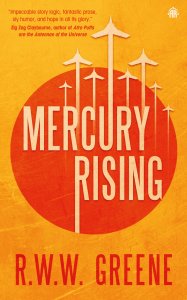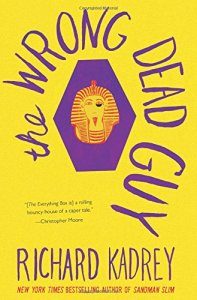Paul Di Filippo reviews K.J. Parker
Never having sampled K. J. Parker’s many acclaimed novels, I relished the chance to encounter at least the author’s more rare shorter fiction as an introduction to Parker’s style and concerns. This volume from Subterranean—exhibiting the panache and sterling craftsmanship generally associated with that house—collects thirteen items. Given that the Internet Science Fiction Database lists exactly twelve stories total for Parker, only a couple of which do not show up here, being supplemented with three non-fiction pieces, this collection pretty much represents Parker’s entire short-story oeuvre to date.
I have not yet in this review, you might notice, employed a male or female pronoun to refer to Parker, since the writer’s true identity remains a stout, impenetrable mystery. Unlike many folks who chose a pen name that is an open secret meant to fool only the Bookscan sales-tracking algorithms, Parker seems genuinely to want privacy and anonymity, a Tiptree for the twenty-first century. So we will stick with the gender nonspecificity.
Before delving into the fiction, let me report that the three essays—”On Sieges,” “Cutting Edge Technology,” and “Rich Men’s Skins”—exhibit a fair measure of the erudition and charm of Robert Silverberg, L. Sprague de Camp and Avram Davidson, qualities of which authors extend to the fiction as well.
“A Small Price to Pay for Birdsong,” the opening story, won the World Fantasy Award, and it’s plain to see why. The elegance of its convolutions, the sharp conflict between archetypical characters, and the keenness of its moral ambiguities all consort to produce an exceptional tale. An older man, a music teacher and mediocre composer, finds his prize pupil about to be hung, with some measure of justice, for a rash murder. The genius lad escapes with the professor’s grudging help, but in leaving burdens the professor with a strange unhealthy measure of unearned success. Their relationship resumes after an interval, and becomes more twisted and complicated than ever. End of story.
The venue seems at first to be a somewhat off-the-shelf fantasy world which still has plenty of sharp, amusing details to give it solidity, but also a fairytale kind of generic broadness that helps the tale assume a certain wide application of fabulism. There’s no blood and thunder, just a rather precise and droll recounting of events. Parker is also fond of multiple mini-climaxes and lateral zigzags in the plotting.
“A Rich, Full Week” finds a healing “wizard” on his rounds in a similar storybook realm, encountering as patients first a killer zombie and then a youngster in a coma. Employing psychical skills akin to those of Zelazny’s Dream Master, the wizard finds his two cases oddly intersecting. Told with the same laconic restraint as before, despite a greater number of action-packed scenes, Parker’s fiction begins to look rather mannerpunk in its chosen approaches.
“Amor Vincit Omnia” shares a continuity with the prior piece and with the one that follows. And this continuity enlarges Parker’s subcreation, with the arrival of many more inventive details about the land’s history and magical systems. Let’s call these stories the “Studium” cycle. Another wizard from that fabled college/guild of wizards, the Studium, must confront an untrained wild talent who possesses murderous instincts and an unprecedented talent. Cheating and collateral damage to civilians provides the morally dubious win.
“Let Maps to Others” is certainly be my favorite piece here. A ironic and blackly humorous account of the rediscovery of a Prester John-style kingdom lost to history involves scholarly rivalry and deceit and royal bull-headedness. It’s comic gold where, as in much comedy, the most vile deeds are the funniest.
Parker presents dual protagonists in “A Room With a View.” An older adept and a younger female student explore the mystical realm of the Rooms in a manner akin to a Matthew Hughes story. But who’s leading whom by the nose? “Illuminated” involves a similar duo, and concerns the dangerous powers and knowledge inherent in an ancient manuscript.
Both these latter two stories contain a few humorous comments from the male POV about the unsuitability of women for magic. Can we assume from these that Parker is male? Recalling Robert Silverberg’s famous gaffe when he insisted Tiptree had to be a man, based on the Tiptree voice, I am not inclined to go out on a similar ledge. Parker is plainly sophisticated enough to be pulling a double bluff on us with such asides.
“Purple and Black” is a full novella in the Studium cycle where realpolitik takes center stage, through an enlightening and amusing epistolary exchange between Emperor and his insurgency-battling underling. It goes on just a tad too long for my tastes, however.
But the next item, “The Sun and I,” my second-favorite piece, is a paradoxical miracle of compression and glorious over-stuffedness, just perfect in fact. In “Purple and Black” we saw that there existed a religion dubbed the Invincible Sun. Now we learn of its founding by a handful of young rogues and wastrels intent on mulcting the public with a scam. But their sham cult soon turns into a real one, metaphysics and all, and the joke is on them. The first-person narration is charmingly amoral, as the voice also is in the subsequent two allied tales. “One Little Room An Everywhere” concerns a forger of Invincible Sun icons, while “Blue & Gold” gives us the exploits of a rascally alchemist whose experiments start out by killing his wife and go downhill from there.
This final story crystallized for me an echo I had been hearing in Parker’s stories: the voice of Fritz Leiber. The same sophisticated worldliness, acceptance of cosmic indifference or perverseness, and amiable rascality as a mode of getting through life is here as well, nicely done. I might also mention that the use of the place name “Mezentia” divulges another possible influence: the elegant mannerism of E. R. Eddison, as in The Mezentian Gate.
K. J. Parker’s fiction, then, proves itself insouciant, mocking, wry, unpredictable and polished, without any of the cliches of High Fantasy. I can’t wait to try his—or her—novels.







